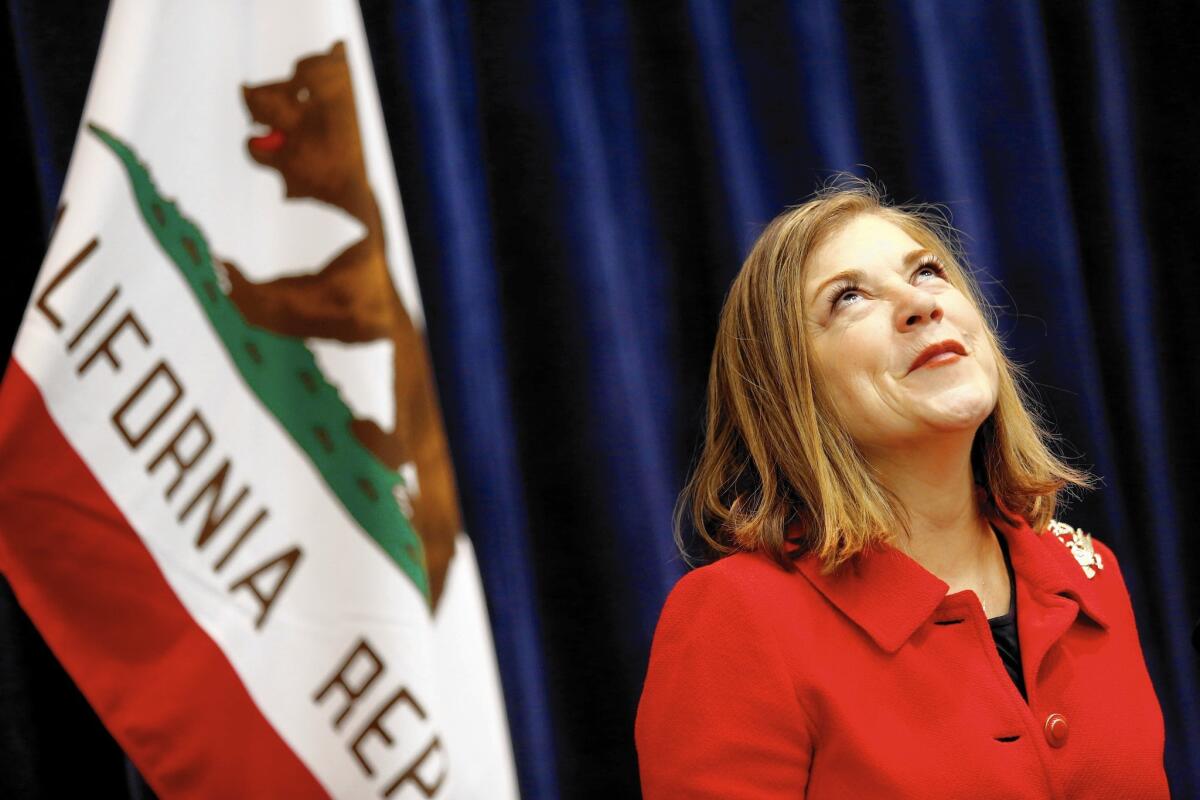Indian Americans speak out after Loretta Sanchez gaffe

U.S. Rep. Loretta Sanchez’s war cry gaffe at Saturday’s
- Share via
Rep. Loretta Sanchez brought unwelcome attention to her fledgling campaign for U.S. Senate this weekend with an ill-fated “war cry” gesture that became the talk of the state Democratic Party convention.
But her gaffe, which offended some and baffled others, also abruptly turned a spotlight on the state’s growing roster of Indian American political candidates — and the donor class that is behind them.
That’s because Sanchez made her verbal misfire as the headliner for the Indian-American Caucus Reception, an event that showcased key candidates in next year’s election. Three candidates for Assembly, all of Indian descent, made appearances at the event. The top host on the invitation was Rep. Ami Bera (D-Elk Grove), the only Indian American currently in the House of Representatives.
“There is a growing appetite in the community to get involved in the political world, both in terms of mobilizing to vote and in fundraising,” said Rajiv Dalal, who is running to represent Glendale and Burbank in the Assembly next year. Dalal, who recently served as L.A.’s deputy film czar, spoke at Saturday’s Sanchez event.
More than 600,000 Indian Americans live in California, more than in any other state, according to data from the U.S. Census Bureau and the nonpartisan Migration Policy Institute. Yet last year, a pair of high-profile Indian American candidates fell short in their bids for political office.
Republican former U.S. Treasury official Neel Kashkari was viewed largely as a sacrificial lamb in last year’s contest against Gov. Jerry Brown, who easily secured another four-year term. And Democrat Ro Khanna, a former Obama administration official, failed to oust veteran Rep. Mike Honda (D-San Jose) despite raising enough money to mount a formidable campaign.
For Indian Americans, a serious milestone could come next year in the contest to replace U.S. Sen. Barbara Boxer. California Atty. Gen. Kamala Harris, viewed by many as the frontrunner, has a father who is Jamaican and a mother who was Indian. Harris criticized Sanchez’s actions, a clumsy effort at differentiating between Native Americans and those of Indian descent, calling them “shocking.”
Saturday’s stumble could haunt Sanchez in the coming months, said Karthick Ramakrishnan, professor of public policy at UC Riverside and a researcher on political participation by Asian Americans. Other campaigns have shown that a single verbal blunder can have devastating results.
In 2006, then-U.S. Sen. George Allen saw his bid for reelection in Virginia collapse after he used what many considered to be an ethnic racial slur against an opponent’s campaign aide. The target of the slur was Indian American.
Although Sanchez’s misstep was nowhere near as serious, insensitivity frequently becomes fodder for fundraising by an opposing candidate, Ramakrishnan said. A campaign can use such statements to send the message that “this is a candidate that does not understand your community,” he said.
Among those who attended Saturday’s reception, reaction to Sanchez’s gaffe ran the gamut. Sayu Bhojwani, New York City’s former commissioner of immigrant affairs, described the comments as a “stark reminder” that “racial insensitivity is not the purview of Republicans or whites, but is pervasive across party and ethnic lines.”
“I was taken aback, as many others in the audience were, at her insensitivity, which immediately alienated non-Indian guests as well,” said Bhojwani, who is of Indian descent.
Others were less troubled. Aaruni Thakur, one of the hosts of Saturday’s reception, said Sanchez’s overall speech was “very positive” for the Indian American community.
“I really think what she said is being taken out of context,” said Thakur, 35. “We understood what she was trying to say.”
The first Indian American to serve in the House of Representatives was Dalip Singh Saund, a Democrat from Southern California elected in 1957. In recent years, the most prominent Indian American politicians on the national stage have been Republican.
In South Carolina, Republican Nikki Haley found huge success in appealing to white voters during her successful 2010 gubernatorial campaign. In Louisiana, Gov. Bobby Jindal has heavily emphasized conservative social values, such as opposition to gay marriage.
Harmeet Dhillon, a Sikh who holds the No. 2 post with the California Republican Party, said Indian Americans should not be viewed as a monolithic voting bloc. In California, politically active Indian Americans range from left-leaning trial lawyers to fiscally conservative hotel owners, said Dhillon, who ran unsuccessfully for state Senate in 2012.
For now, the political power of the Indian American community can be seen most clearly in its fundraising, particularly for Khanna in the Bay Area, said Dalal, the lawyer who is running for Assembly.
“The most relevance we’ve had is in writing checks to other people,” added San Jose City Councilman Ash Kalra, who attended Saturday’s reception and is also running for the Assembly.
Giving money is no longer going to be enough for Indian Americans in either party, Dhillon said.
“These are moneyed and successful and educated people, and we don’t want to be ATM machines anymore,” Dhillon said. “We want to be the candidates. We want to be the governor.”
Twitter: @davidzahniser
Twitter: @kurtisalee
Times staff writer Angel Jennings contributed to this report.
More to Read
Sign up for Essential California
The most important California stories and recommendations in your inbox every morning.
You may occasionally receive promotional content from the Los Angeles Times.















